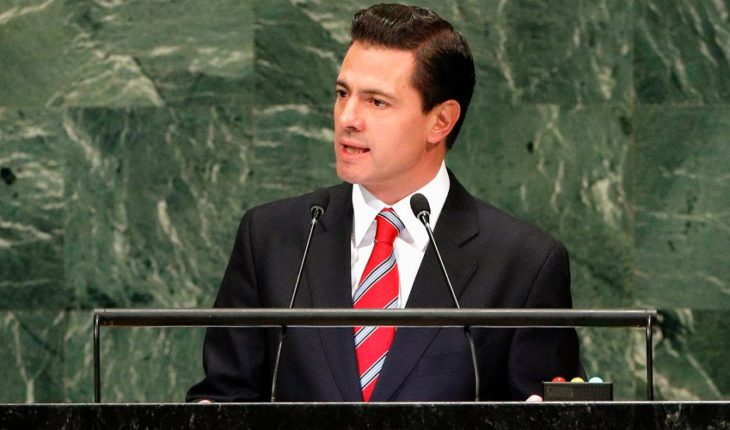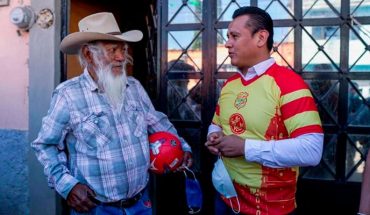on November 7, the eyes of the world will be on Mexico. The third Universal periodic review on the situation of human rights in the country, the UN mechanism known as #EPU is scheduled on that date.
This assessment will be a kind of final exam of the Government of Enrique Peña Nieto, just a few days that will be concluded between the PRI as the head of the Mexican State.
“This year in particular, is especially important because (UPR) comes right in the context of transition in the country, and we think that it constitutes at the same time an assessment of the Presidency of Enrique Peña Nieto”, he said in an interview Stephanie Erin Brewer, Coordinator international area of Center Prodh.
“Comes at a time of many changes and many opportunities to reorient the actions of the State, policies,” he added.
It is the second time that applies the #EPU, during the Government of Peña Nieto. The first was in 2013. Then Mexico received dozens of recommendations, such as establishing a comprehensive program to reduce violence against women; create a database of missing migrants; improve the conditions of prisons; step up efforts to combat corruption and impunity, and ensure assignments of budget for the mechanism of protection of rights defenders and journalists, among other issues.
The Nations of the United Nations will decide on its implementation and will make new recommendations, during the UPR, although citizen in Mexico organizations have already advanced that they qualify as “fail” to the Government of Peña Nieto, because in his view the situation of the human rights in the country has deteriorated.
how the evaluation
the Universal periodic review (UPR) is a tool for the 193 countries members of the Organization of the United Nations (UN) review, peer, the work of their States with respect to the location of the dere human rights in its territory. Challenges there are, what are the most worrying violations, and what practices can be implemented to improve.
Although officially there is a category of “pass” or “fail”, the mechanism exhibits internationally failures or shortcomings of States, so that Nations make proposals and help to improve the situation of human rights.
On 7 November, a delegation of Mexican officials in Geneva, Switzerland, which is the headquarters of the UN Human Rights Council, will receive questions from representatives of other Nations, about what’s happening with themes such as the system of Justice in the country violence, disappearances, the legal framework and impunity.
In fact, some countries already ahead of your specific questions. Germany questioned to Mexico by espionage cases to rights defenders and journalists, and if the National Commission for the search of missing persons have enough budget and staff.
United States asked about what Mexico has “failed” to establish an independent Prosecutor, and when corporations of police will be ready to take charge completely for public security, rather than the army also make this work.
read: #EPU2018: EU and Germany question to Mexico about Ayotzinapa, disappearance and murder of journalists
the Government of Enrique Peña Nieto officials can respond to the questions and expose what they consider progress
All Nations have the opportunity to ask questions to Mexico, although to have order, the EPU works with working groups. The Working Group for the review of November 7 there will be a delegate of Rwanda, one from South Korea and one from Panama.
This group of delegates or reporters, known as the troika, will order and broadcast the questions that have made Mexico, the Nations of the UN in an interactive dialogue of 3 and a half hours, where you can also make questions, ask for clarification or point out opportunities for improvement.
At the conclusion of the dialogue, the troika will draw up a summary that includes the questions and observations, and the interventions of the representatives of the Mexican State.
This process leads to two important dates: in December, the Human Rights Council of the UN, from the above in consideration of 7 November, will issue a list of recommendations to Mexico (in 2013 were 176 recommendations).
Then, in March 2019, the Mexican State shall respond to recommendations accepted, and which are not; This time it is acting Andrés Manuel López Obrador’s Government.
3
key documents for the Universal periodic review of November 7, are key three documents that already are available on line.
For questions or comments to Mexico, Nations have at their disposal the national report presented by the State which is subject to review. Includes data from 36 federal agencies, the Supreme Court of Justice, the Council of the Federal judiciary, and the Chambers of Senators and deputies, as the laws adopted in the anti-corruption field, against torture, in respect of enforced disappearance, the implementation of programs and protocols, and figures on poverty and educational backwardness.
The second key document is prepared by the Office of the United Nations High Commissioner for human rights. It contains information on committees or rapporteurs of the United Nations, from visits to Mexico, regarding deficiencies in tasks such as combating environmental pollution, the level of violence “alarmingly high”, extrajudicial executions in cases as Tlatlaya, or torture and arbitrary arrests in the investigation of Ayotzinapa.
The third key document for the #EPU of Mexico is a summary of the observations or recommendations of the National Commission of human rights of Mexico, and hundreds of citizen organizations and collectives. Among other things, in this report the NHRC accuses that instances that should provide security are those who commit major violations of personal safety, that 80% of the victims of trafficking are women, that persists the precarious situation of indigenous peoples, and that the Internal Security Act lacks legal certainty.
#ColectivoEPUmx to influence the evaluation process which will be subjected to the Mexican State, more than 200 organizations citizens were grouped in the #ColectivoEPUmx, and delivered to the United Nations a joint report on failures and challenges the Mexican State, in its mission to preserve the human rights of citizens.
Among the members of the collective are organizations like the Mexican Commission for the defense and promotion of human rights, article 19, the Centro de Derechos Humanos “Miguel Agustín Pro Juárez” (Prodh Center), and the Centre of human rights of the mountain, Tlachinollan.
The report of the civil society, whose data are part of the package of documents with which Nations will do questions to Mexico, can be found here.
In this document, are designated failures that still dominate the systemic and systematic violations against migrants; that the Internal Security Act aims at deepening the militarization of public safety, and that Mexico lives a “critical” situation of violence and impunity, with records of killings and at least 310 thousand displaced persons, since 2009.
In addition to this report, the UPR mechanism established that civil society organizations participate by going to Geneva, and made “workings of incidence so that the State accept the recommendations”, in addition to a public position on the response from the Mexican Government to international scrutiny.
The UPR, said Emilio Álvarez Icaza, former Secretary Executive of the IACHR, is “the most important evaluation in the field of international commitments on human rights”, and the recommendations that arise may be a “road map” for the next Government of Mexico.
why do the NGOs say that EPN is frowned upon?
Erin Brewer, of Center Prodh, explained that the NGOs of the #ColectivoEPUmx do not have a number or percentage of recommendations of 2013 that were fulfilled, because each one of them requires a valuation or a form of rating different, although in general It can be said that prevailed a negative performance.
“A minority of recommendations include action type ‘withdrawing reservations to international treaties’. In such cases, it is possible to measure compliance with binary (yes/no) or numerical. In that matter, the State withdrew 4 reservations to international treaties”, said Brewer.
Other recommendations “binary”, Brewer continued, as abolishing completely the figure of the roots, they were not fulfilled.
“Others that refer to legal reforms or legislative harmonisation show progress, above all by the entry into force of the new criminal justice system and the publication of the general laws on torture and enforced disappearance”, added.
Most of the recommendations made to Mexico refer to “ensure” respect for certain groups, such as women and indigenous people, or “strengthen” mechanisms such as the protection of journalists.
In those cases, said Brewer, the #ColectivoEPUMx concluded that the rule is non-compliance or compliance with very limited or poor, “i.e., the same issues recommended in 2013 usually persist without substantial progress”. That is why they consider the Government of Peña Nieto sale”frowned upon”, on the subject of human rights.
The Mexican State, said the researcher, “has made some progress on paper, although we do not minimize them, missing that they translate into changes in practice and positive impacts on the population”.





